Fleurs du Mal Magazine


Or see the index
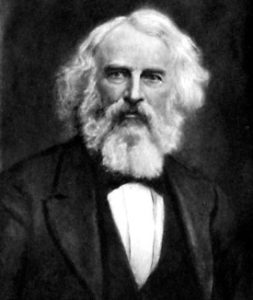
The Arrow and the Song
I shot an arrow into the air,
It fell to earth, I knew not where;
For, so swiftly it flew, the sight
Could not follow it in its flight.
I breathed a song into the air,
It fell to earth, I knew not where;
For who has sight so keen and strong,
That it can follow the flight of song?
Long, long afterward, in an oak
I found the arrow, still unbroke;
And the song, from beginning to end,
I found again in the heart of a friend.
Henry Wadsworth Longfellow
(1807–1882)
The Arrow and the Song
• fleursdumal.nl magazine
More in: Archive K-L, Archive K-L, Longfellow, Henry Wadsworth
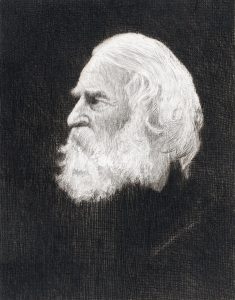
Aftermath
When the summer fields are mown,
When the birds are fledged and flown,
And the dry leaves strew the path;
With the falling of the snow,
With the cawing of the crow,
Once again the fields we mow
And gather in the aftermath.
Not the sweet, new grass with flowers
Is this harvesting of ours;
Not the upland clover bloom;
But the rowen mixed with weeds,
Tangled tufts from marsh and meads,
Where the poppy drops its seeds
In the silence and the gloom.
Henry Wadsworth Longfellow
(1807–1882)
Aftermath
• fleursdumal.nl magazine
More in: Archive K-L, Archive K-L, Longfellow, Henry Wadsworth

Chaucer
An old man in a lodge within a park;
The chamber walls depicted all around
With portraitures of huntsman, hawk, and hound,
And the hurt deer. He listeneth to the lark,
Whose song comes with the sunshine through the dark
Of painted glass in leaden lattice bound;
He listeneth and he laugheth at the sound,
Then writeth in a book like any clerk.
He is the poet of the dawn, who wrote
The Canterbury Tales, and his old age
Made beautiful with song; and as I read
I hear the crowing cock, I hear the note
Of lark and linnet, and from every page
Rise odors of ploughed field or flowery mead.
Henry Wadsworth Longfellow
(1807–1882)
Chaucer
• fleursdumal.nl magazine
More in: Archive K-L, Archive K-L, Geoffrey Chaucer, Longfellow, Henry Wadsworth
The Day is Done
The day is done, and the darkness
Falls from the wings of Night,
As a feather is wafted downward
From an eagle in his flight.
I see the lights of the village
Gleam through the rain and the mist,
And a feeling of sadness comes o’er me
That my soul cannot resist:
A feeling of sadness and longing,
That is not akin to pain,
And resembles sorrow only
As the mist resembles the rain.
Come, read to me some poem,
Some simple and heartfelt lay,
That shall soothe this restless feeling,
And banish the thoughts of day.
Not from the grand old masters,
Not from the bards sublime,
Whose distant footsteps echo
Through the corridors of Time.
For, like strains of martial music,
Their mighty thoughts suggest
Life’s endless toil and endeavor;
And to-night I long for rest.
Read from some humbler poet,
Whose songs gushed from his heart,
As showers from the clouds of summer,
Or tears from the eyelids start;
Who, through long days of labor,
And nights devoid of ease,
Still heard in his soul the music
Of wonderful melodies.
Such songs have power to quiet
The restless pulse of care,
And come like the benediction
That follows after prayer.
Then read from the treasured volume
The poem of thy choice,
And lend to the rhyme of the poet
The beauty of thy voice.
And the night shall be filled with music,
And the cares, that infest the day,
Shall fold their tents, like the Arabs,
And as silently steal away.
Henry Wadsworth Longfellow
More in: Archive K-L, Longfellow, Henry Wadsworth

The owl
by Henry Wadsworth Longfellow
The owl, —
Au
The owl
Au
The great black
Owl
Au
Hi! a! haa!
Henry Wadsworth Longfellow, letter to Ferdinand Freiligrath, January 11, 1856; adapted from Henry Rowe Schoolcraft, Information Respecting the History, Condition, and Prospects of the Indian Tribes of the United States, vol. I, 1851. (Source: UbuWeb)
fleursdumal.nl magazine
More in: Archive K-L, Longfellow, Henry Wadsworth
.jpg)
Henry Wadsworth Longfellow
(1807-1882)
The Arrow and The Song
I shot an arrow into the air,
It fell to earth, I knew not where;
For, so swiftly it flew, the sight
Could not follow it in its flight.
I breathed a song into the air,
It fell to earth, I knew not where;
For who has sight so keen and strong,
That it can follow the flight of song?
Long, long afterward, in an oak
I found the arrow, still unbroke;
And the song, from beginning to end,
I found again in the heart of a friend.
.jpg)
H.W. Longfellow poetry
kempis.nl poetry magazine
More in: Archive K-L, Longfellow, Henry Wadsworth
.jpg)

Aftermath
by Henry Wadsworth Longfellow
(1807 – 1882)
When the summer fields are mown,
When the birds are fledged and flown,
And the dry leaves strew the path;
With the falling of the snow,
With the cawing of the crow,
Once again the fields we mow
And gather in the aftermath.
Not the sweet, new grass with flowers
Is this harvesting of ours;
Not the upland clover bloom;
But the rowen mixed with weeds,
Tangled tufts from marsh and meads,
Where the poppy drops its seeds
In the silence and the gloom.
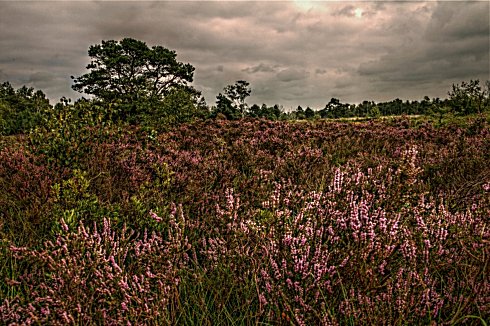
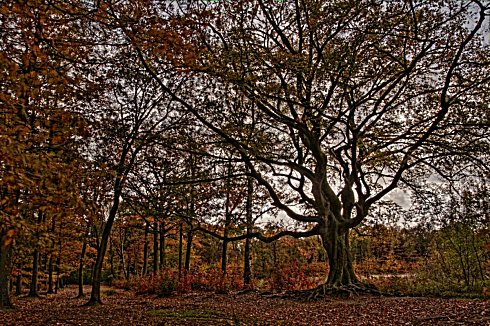
Hans Hermans Natuurdagboek Oktober 2010
Poem: Henry Wadsworth Longfellow
kempis poetry magazine
More in: Hans Hermans Photos, Longfellow, Henry Wadsworth
.jpg)
Henry Wadsworth Longfellow
(1807-1882)
Twilight
The twilight is sad and cloudy,
The wind blows wild and free,
And like the wings of sea-birds
Flash the white caps of the sea.
But in the fisherman’s cottage
There shines a ruddier light,
And a little face at the window
Peers out into the night.
Close, close it is pressed to the window,
As if those childish eyes
Were looking into the darkness,
To see some form arise.
And a woman’s waving shadow
Is passing to and fro,
Now rising to the ceiling,
Now bowing and bending low.
What tale do the roaring ocean,
And the night-wind, bleak and wild,
As they beat at the crazy casement,
Tell to that little child?
And why do the roaring ocean,
And the night-wind, wild and bleak,
As they beat at the heart of the mother,
Drive the color from her cheek?
.jpg)
H.W. Longfellow poetry
kempis poetry magazine
More in: Archive K-L, Longfellow, Henry Wadsworth
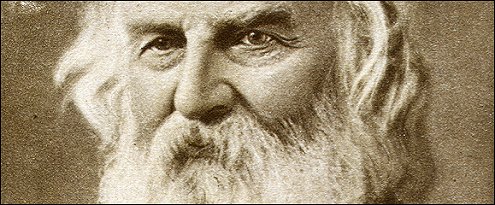
Henry Wadsworth Longfellow
(1807-1882)
The Old Clock on The Stairs
L’eternite est une pendule, dont le balancier dit et redit sans
cesse ces deux mots seulement dans le silence des tombeaux:
"Toujours! jamais! Jamais! toujours!"–JACQUES BRIDAINE.
Somewhat back from the village street
Stands the old-fashioned country-seat.
Across its antique portico
Tall poplar-trees their shadows throw;
And from its station in the hall
An ancient timepiece says to all,–
"Forever–never!
Never–forever!"
Half-way up the stairs it stands,
And points and beckons with its hands
From its case of massive oak,
Like a monk, who, under his cloak,
Crosses himself, and sighs, alas!
With sorrowful voice to all who pass,–
"Forever–never!
Never–forever!"
By day its voice is low and light;
But in the silent dead of night,
Distinct as a passing footstep’s fall,
It echoes along the vacant hall,
Along the ceiling, along the floor,
And seems to say, at each chamber-door,–
"Forever–never!
Never–forever!"
Through days of sorrow and of mirth,
Through days of death and days of birth,
Through every swift vicissitude
Of changeful time, unchanged it has stood,
And as if, like God, it all things saw,
It calmly repeats those words of awe,–
"Forever–never!
Never–forever!"
In that mansion used to be
Free-hearted Hospitality;
His great fires up the chimney roared;
The stranger feasted at his board;
But, like the skeleton at the feast,
That warning timepiece never ceased,–
"Forever–never!
Never–forever!"
There groups of merry children played,
There youths and maidens dreaming strayed;
O precious hours! O golden prime,
And affluence of love and time!
Even as a Miser counts his gold,
Those hours the ancient timepiece told,–
"Forever–never!
Never–forever!"
From that chamber, clothed in white,
The bride came forth on her wedding night;
There, in that silent room below,
The dead lay in his shroud of snow;
And in the hush that followed the prayer,
Was heard the old clock on the stair,–
"Forever–never!
Never–forever!"
All are scattered now and fled,
Some are married, some are dead;
And when I ask, with throbs of pain.
"Ah! when shall they all meet again?"
As in the days long since gone by,
The ancient timepiece makes reply,–
"Forever–never!
Never–forever!"
Never here, forever there,
Where all parting, pain, and care,
And death, and time shall disappear,–
Forever there, but never here!
The horologe of Eternity
Sayeth this incessantly,–
"Forever–never!
Never–forever!"
.jpg)
H. W. Longfellow poetry
kempis poetry magazine
More in: Longfellow, Henry Wadsworth
.jpg)
Henry Wadsworth Longfellow
(1807-1882)
The Secret of The Sea
Ah! what pleasant visions haunt me
As I gaze upon the sea!
All the old romantic legends,
All my dreams, come back to me.
Sails of silk and ropes of sandal,
Such as gleam in ancient lore;
And the singing of the sailors,
And the answer from the shore!
Most of all, the Spanish ballad
Haunts me oft, and tarries long,
Of the noble Count Arnaldos
And the sailor’s mystic song.
Like the long waves on a sea-beach,
Where the sand as silver shines,
With a soft, monotonous cadence,
Flow its unrhymed lyric lines:–
Telling how the Count Arnaldos,
With his hawk upon his hand,
Saw a fair and stately galley,
Steering onward to the land;–
How he heard the ancient helmsman
Chant a song so wild and clear,
That the sailing sea-bird slowly
Poised upon the mast to hear,
Till his soul was full of longing,
And he cried, with impulse strong,–
"Helmsman! for the love of heaven,
Teach me, too, that wondrous song!"
"Wouldst thou,"–so the helmsman answered,
"Learn the secret of the sea?
Only those who brave its dangers
Comprehend its mystery!"
In each sail that skims the horizon,
In each landward-blowing breeze,
I behold that stately galley,
Hear those mournful melodies;
Till my soul is full of longing
For the secret of the sea,
And the heart of the great ocean
Sends a thrilling pulse through me.
.jpg)
H.W. Longfellow poetry
kempis poetry magazine
More in: Longfellow, Henry Wadsworth
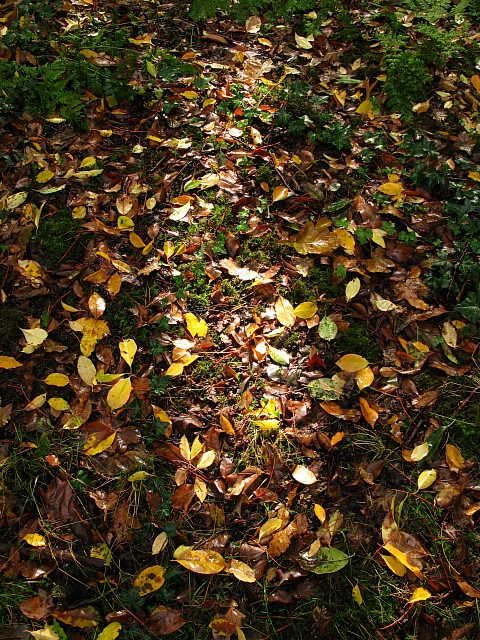
Henry Wadsworth Longfellow
(1807-1882)
Autumn
Thou comest, Autumn, heralded by the rain,
With banners, by great gales incessant fanned,
Brighter than brightest silks of Samarcand,
And stately oxen harnessed to thy wain!
Thou standest, like imperial Charlemagne,
Upon thy bridge of gold; thy royal hand
Outstretched with benedictions o’er the land,
Blessing the farms through all thy vast domain!
Thy shield is the red harvest moon, suspended
So long beneath the heaven’s o’er-hanging eaves;
Thy steps are by the farmer’s prayers attended;
Like flames upon an altar shine the sheaves;
And, following thee, in thy ovation splendid,
Thine almoner, the wind, scatters the golden leaves!
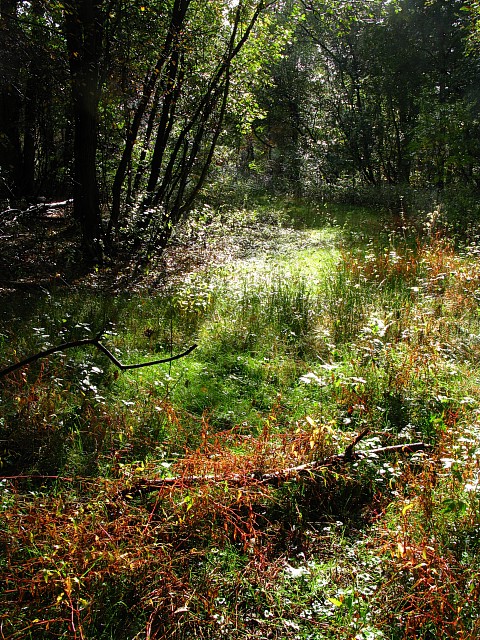

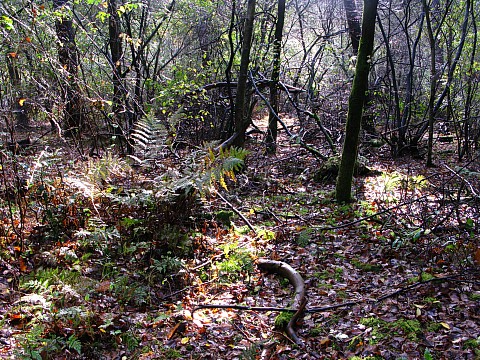
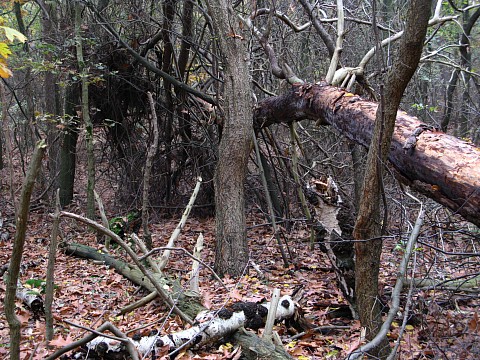
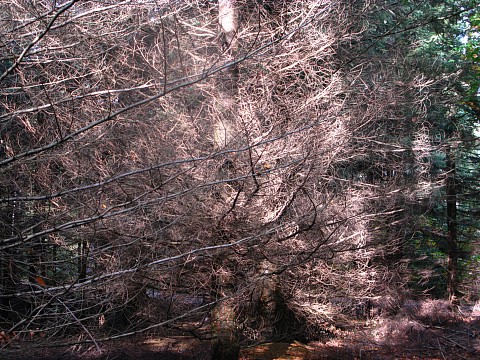


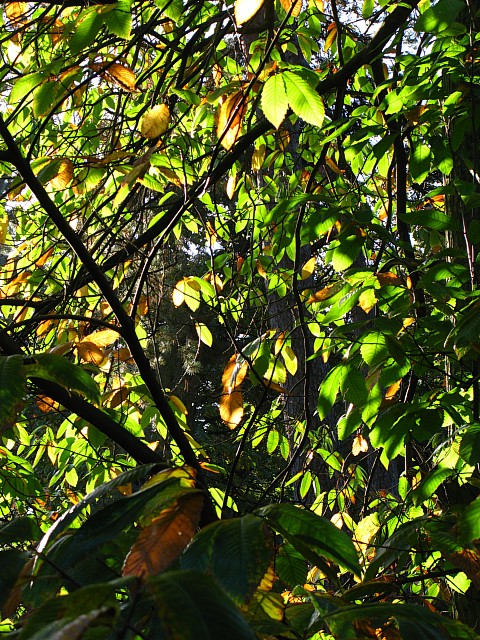
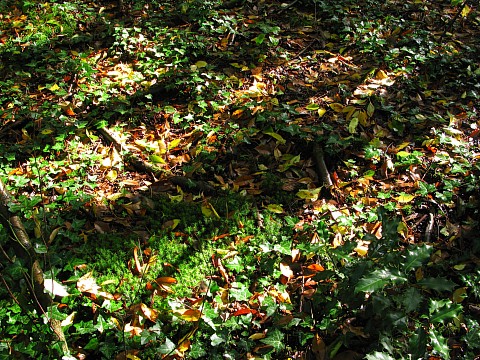
Ton van Kempen photos: Autumn 2
H. W. Longfellow poetry
.jpg)
fleursdumal.nl magazine
More in: 4SEASONS#Autumn, CLASSIC POETRY, Longfellow, Henry Wadsworth, Ton van Kempen Photos
.jpg)
Henry Wadsworth Longfellow
(1807-1882)
Curfew
I
Solemnly, mournfully,
Dealing its dole,
The Curfew Bell
Is beginning to toll.
Cover the embers,
And put out the light;
Toil comes with the morning,
And rest with the night.
Dark grow the windows,
And quenched is the fire;
Sound fades into silence,–
All footsteps retire.
No voice in the chambers,
No sound in the hall!
Sleep and oblivion
Reign over all!
II
The book is completed,
And closed, like the day;
And the hand that has written it
Lays it away.
Dim grow its fancies;
Forgotten they lie;
Like coals in the ashes,
They darken and die.
Song sinks into silence,
The story is told,
The windows are darkened,
The hearth-stone is cold.
Darker and darker
The black shadows fall;
Sleep and oblivion
Reign over all.
.jpg)
H. W. Longfellow poetry
kempis poetry magazine
More in: Longfellow, Henry Wadsworth
Thank you for reading Fleurs du Mal - magazine for art & literature